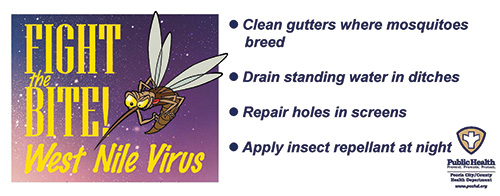
By DIANA SCOTT
In Public Health we’ve talked a lot about different infections the past few years, but not much about West Nile virus (WNV). With summer still here in central Illinois, we now have WNV in mosquitoes and the risk of infection in humans. Summer and fall are usual times when WNV appears in mosquitoes, and we’ve recently seen a mosquito pool in Peoria County test positive for WNV. That’s a good indication that the virus is circulating in our area. Mosquitoes don’t just stay in one location. They fly around and cross locations. So now we need to “Fight the Bite” and take precautions against mosquitoes carrying WNV.
Mosquitoes and birds
The most common method of WNV infection is through a mosquito bite from mosquitoes that feed on birds infected with West Nile. Each year area health departments provide community monitoring and prevention measures such as setting mosquito traps to watch for areas of mosquito breeding and then testing those mosquitoes for WNV. Measures also include collecting and testing of dead birds such as crows and blue jays. If you see a dead bird, don’t handle it with your bare hands; double wrap it in plastic garbage bags before you dispose of it.
More than an itch
While most people just have an itch from a mosquito bite, people who get WNV may have other symptoms from mild to severe. Mild symptoms of WNV infection can include headache, swollen glands, and skin rash on the body and can last for a few days to a few weeks. Severe symptoms of WNV illness can include high fever, headache, disorientation, convulsions, vision loss, and paralysis. These symptoms may last weeks, and neurological effects may be permanent. People over 50 years of age and those with weakened immune systems have the highest risk of developing severe illness due to WNV.
Prevention — the 3 R’s
While there is no treatment for WNV, there are prevention measures. The best way to prevent WNV infection is to reduce the number of mosquitoes around your home and take personal precautions. Here are some easy tips for you to Fight the Bite:
REDUCE exposure:
- Avoid being outdoors when mosquitoes are most active, especially between dusk and dawn.
- Make sure doors and windows have tight-fitting screens. Repair or replace screens that have tears or other openings. Summer vacation is the perfect time to make those home repairs.
- Try to keep doors and windows shut, especially at night.
- Eliminate all sources of standing water that can support mosquito breeding, including water in bird baths, ponds, flowerpots, wading pools, old tires, and any other receptacles.
REPEL mosquitoes:
- When outdoors, wear shoes and socks, long pants, and a long-sleeved shirt. Summer can be hot for long pants in the evening, but most people think that’s better than having a bunch of mosquito bites.
- Apply insect repellant that includes DEET, picaridin, oil of lemon eucalyptus, or IR 3535 according to label instructions. Consult a physician before using repellants on infants.
REPORT mosquito breeding grounds:
In communities where there are organized mosquito control programs, contact your municipal government to report areas of stagnant water in roadside ditches, flooded yards, and similar locations that may produce mosquitoes.
Public health
WNV is an important public health issue in our area. For more information on other public health issues, visit the Peoria City/County Health Department’s website at www.pcchd.org.
— Diana Scott, MS
Communications and Public Health Programs, Manager Community Health Policy and Planning, Peoria City/County Health Department
